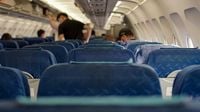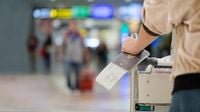The days of frantic searches for boarding passes or rushing to check in before heading to the airport may soon become a thing of the past. The International Civil Aviation Organization (ICAO), a United Nations agency that regulates global air travel policy, is set to revolutionize the way we travel by introducing a digital travel passport, according to The Guardian. These changes could be implemented within the next three years, fundamentally altering current check-in and boarding procedures.
Currently, passengers must check in for their flights, either online or at the airport, and receive a boarding pass with a barcode that is scanned at multiple checkpoints, including the boarding gate. However, the new regulations propose a complete elimination of these steps. Instead of a boarding pass, travelers will download a "digital travel passport" directly to their phones at the time of booking. This digital document will automatically update in the event of flight changes, requiring no manual intervention from the traveler.
So, how will this digital travel passport work? Travelers will upload their passports to their mobile devices and navigate through airports using facial recognition for verification. Gone will be the traditional check-in process; airline systems will be automatically notified when passengers arrive at the airport and are scanned facially. Valérie Viale, product director at travel technology company Amadeus, emphasized to The Times that this represents "the biggest change in the last 50 years" in the aviation industry. "The last significant upgrade occurred in the early 2000s with the introduction of electronic tickets. Now, the industry has decided it’s time to move to modern systems similar to those used by Amazon," Viale stated.
Implementing this system will require significant investments in airport infrastructure, including facial recognition technology and the ability to read digital passports from mobile devices. While the new technology raises some privacy concerns, Amadeus asserts that it has developed a system where personal data is deleted within a maximum of 15 seconds after each contact with a checkpoint (for example, security gates).
Another promising innovation is that if a passenger misses a connecting flight for reasons beyond their control, the new system will automatically send a notification to their phone with the details of the new flight. The digital passport will update automatically, allowing the passenger to board without additional hassle. "Right now, airline systems are fragmented," Viale explained. "Booking is managed separately from check-in. In the future, everything will be integrated, and the digital passport will be dynamic."
ICAO's initiative to implement a digital air travel permit that enables passengers to use only their mobile phones and facial recognition at airports could significantly impact how we interact with air services. These changes may take effect within the next three years, fundamentally altering the current check-in process.
Instead of the manual check-in process, passengers will download a digital travel permit to their phones as soon as they book their flights. This digital permit will automatically update in the event of booking changes, replacing the traditional boarding pass that is scanned multiple times at the airport. Moreover, this system will allow passengers to upload their passports to their phones, and verification will be done through facial recognition.
Valérie Viale, director of product management at Amadeus, reiterated that these changes represent the biggest transformation in the last 50 years within the aviation sector. She noted that the last significant change in the industry was the implementation of e-tickets in the early 2000s. Now, the industry is ready to adopt modern systems inspired by technologies used by major companies like Amazon.
However, for these plans to come to fruition, airports and airlines will need to invest heavily in infrastructure. Advanced facial recognition technologies and systems capable of reading passports from passengers' mobile devices will need to be installed. Additionally, modifications to existing systems will be necessary, many of which have not undergone significant changes in over 50 years.
Implementing such a system could raise questions about personal data protection and privacy. Amadeus has emphasized that passenger data will be deleted within a maximum of 15 seconds after each contact with a "checkpoint," such as security gates, to prevent any potential privacy violations.
Moreover, these changes could also affect the management of delays and connecting flights. For instance, if a passenger misses a connecting flight due to reasons beyond their control, they will receive an automatic notification on their phone with the details of the new flight, and their digital travel permit will update automatically, allowing them to board without further formalities.
According to Viale, the new technologies will enable a much smoother integration of booking and ticket delivery systems. "Currently, airline systems operate in isolation. In the future, everything will be much more fluid, and the travel permit will be dynamic, updating automatically as the passenger progresses through the airport," she said.
In summary, the implementation of a digital travel system based on facial recognition promises to mark a significant shift in the airline industry. If successfully executed, this system aims to make air travel faster, safer, and more efficient, eliminating many of the time-consuming traditional steps at airports.





